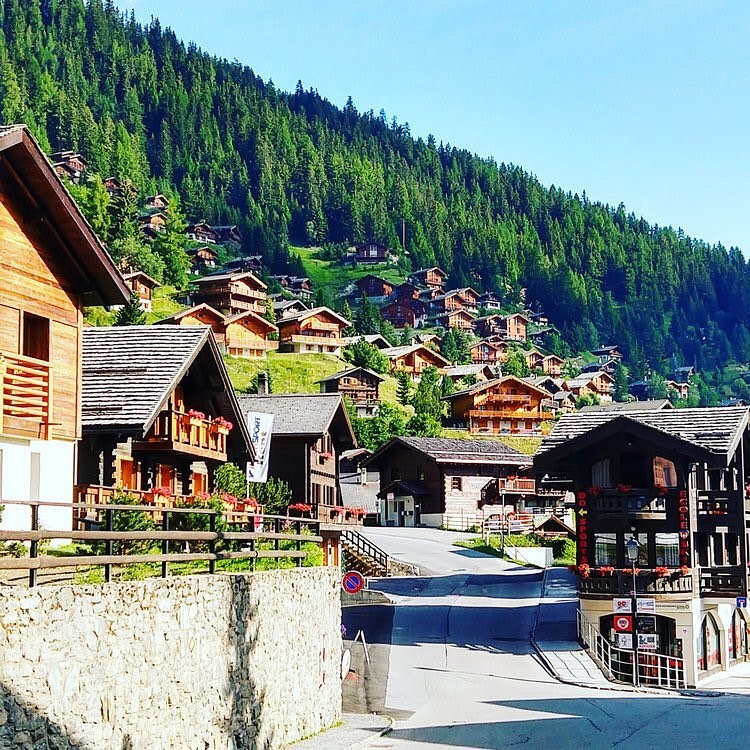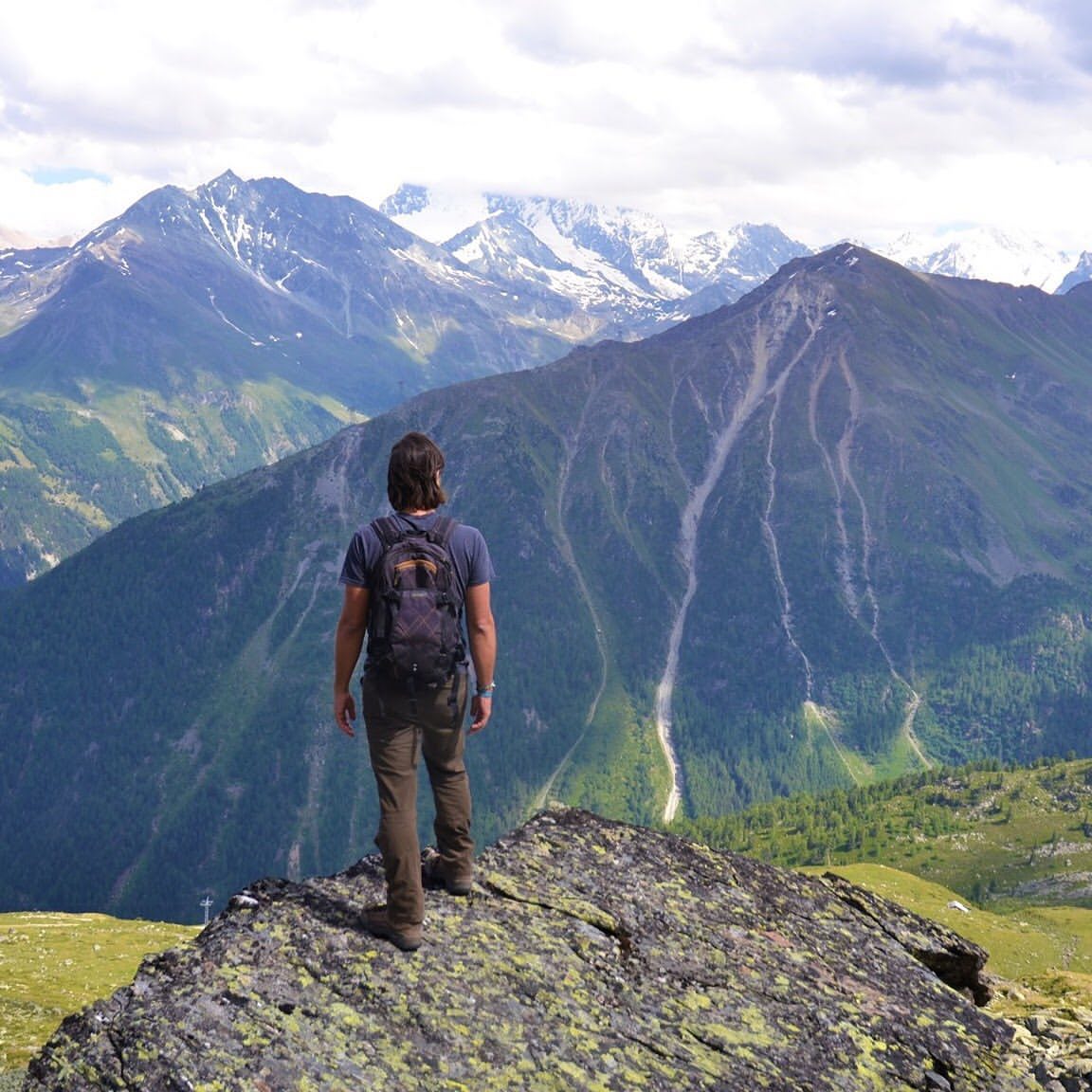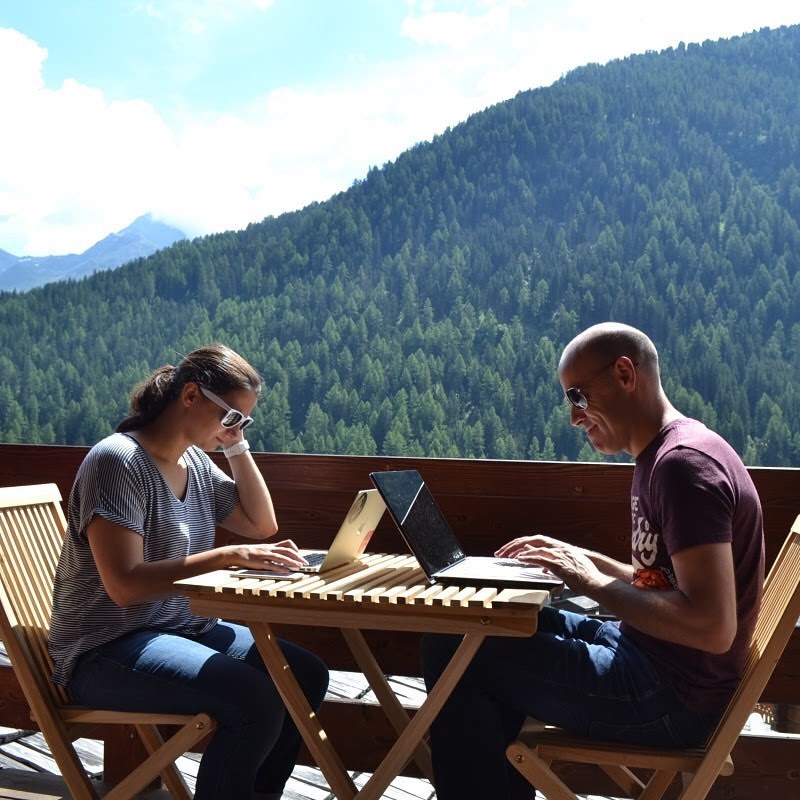
2.1
The next stop on our journey through Swiss Utopias takes us to Swiss Escape: a digital haven sitting high above the world in the alpine village of Grimentz. Created in 2016 by Fanny Caloz and Hazique Memon, it is a space open to freelancers, digital nomads and remote workers who are looking for a place where they can work in their usual way while enjoying nature and its surrounding activities without having to suffer from isolation. Responding to the rise of the ‘bleisure’ traveller and hybrid working, Swiss Escape offers digital nomads accommodation in the heart of the Alps, for what they describe as the ideal place “to combine efficient work, fun and freedom”, and foster a new type of community. At the same time, Swiss Escape pays back into the local area by combating the phenomenon of “cold beds” during the low seasons when tourism dips. It sublets several chalets in Grimentz (one of which is rented all year round). For the owners of these chalets, it’s an unexpected source of income throughout off-peak periods. The accommodation is offered to digital nomads (who are often very flexible) for a period of one to several weeks.

2.2
To foster the right sense of community, co-habitants and workers at Swiss Escape live together in private or shared bedrooms located in different chalets. They share an open lounge area, a kitchen and work space with a high-speed internet connection, as well as a separate videoconference room to avoid disruption. A cultural melting pot located 5000ft above sea level in the Alps, Swiss Escape aims to be a diverse space for the exchange of ideas and ways of working. Digital nomads have easy access to hiking, mountain biking and skiing, as well as the activities and socials organised by the staff: workshops and business-related talks, social dinners and movie nights. To ensure the wellbeing of each guest, a community manager is also present in each chalet. 2.3 With many people working from home during the COVID crisis, there is a growing consensus to reconsider how we work, with a demand for comfort, efficiency and convenience in our workplace environments. But this was just the latest in a trend that emerged before the crisis: “A lot of young people are fed up with this idea of ‘commute-work-sleep'”, says Swiss Escape co-founder Fanny Caloz in an interview with Les Échos. During the pandemic, the community that had been built amongst the nomads managed to thrive as Swiss Escape shut itself off from the world. Community Managers provided regular check-ins for the residents to deal with the anxiety of the situation, as well as indoor social events to keep morale high — something perhaps lacking in cities during the lockdown as city-dwellers were told to isolate with their household only. Other co-working and co-living spaces exist in the world, but are not often found in dense urban areas, according to Swiss Escape’s founders. Looking to export the digital nomad utopia found in Grimentz, they have also created Greek Escape in Crete, as well as founding a global co-living association aimed at building a cooperative of co-living space operators, investors and developers around the world.

2.3
With many people working from home during the COVID crisis, there is a growing consensus to reconsider how we work, with a demand for comfort, efficiency and convenience in our workplace environments. But this was just the latest in a trend that emerged before the crisis: “A lot of young people are fed up with this idea of ‘commute-work-sleep'”, says Swiss Escape co-founder Fanny Caloz in an interview with Les Échos. During the pandemic, the community that had been built amongst the nomads managed to thrive as Swiss Escape shut itself off from the world. Community Managers provided regular check-ins for the residents to deal with the anxiety of the situation, as well as indoor social events to keep morale high — something perhaps lacking in cities during the lockdown as city-dwellers were told to isolate with their household only. Other co-working and co-living spaces exist in the world, but are not often found in dense urban areas, according to Swiss Escape’s founders. Looking to export the digital nomad utopia found in Grimentz, they have also created Greek Escape in Crete, as well as founding a global co-living association aimed at building a cooperative of co-living space operators, investors and developers around the world.